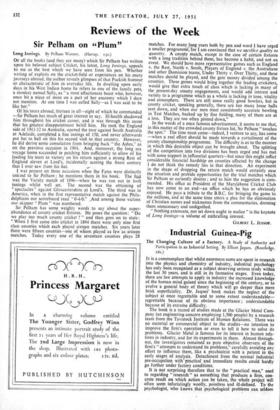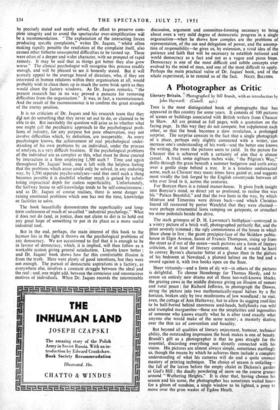Industrial Guinea-Pig
The Changing Culture of a Factory. A Study of Authority and Participation in an Industrial Setting. By Elliott Jaques. (Routledge.
28S.) IT is a commonplace that whilst enormous sums are spent in research into the physics and chemistry of industry, industrial psychology has only been recognised as a subject deserving serious study within the last 30 years, and is still in its formative stages. Even today, there are few attempts to apply in industry the increased knowledge of the human mind gained since the beginning of the century, or to evolve a general body of theory which will go deeper than mere brisk superficiality. Dr. Jaques' book makes the neglect of the subject at once regrettable and to some extent understandable— regrettable because of its obvious importance ; understandable because of its extreme difficulty.
The book is a record of studies made at the Glacier Metal Com- pany (an engineering concern employing 1,500 people) by a research team from the Tavistock Institute of Human 8.elations. There was no material or commercial object to the studies—no intention to improve the firm's operation or even to tell it how to solve its problems. Glacier Metal is famous for its interest in human rela- tions in industry, and for its experiments in them. Almost thrOtigh- out, the investigators remained as pure objective observers of the firm's "attempts to understand its problems," carefully avoiding any effort to influence them, like a psychiatrist with a patient in the early stages of analysis. Detachment from the normal industrial pre-occupation with' practical and immediate results could hardly go further under factory conditions.
It is not surprising therefore that to the "practical man," used to regarding " research " as something that produces a firm, con- crete result on which action can be taken, the whole project will often seem infuriatingly woolly, pointless and ill-defined. To the psychologist, who knows, that psychological problems can seldom
be precisely stated and neatly solved, the effort to preserve com- plete integrity and to avoid the spectacular over-simplification will be a recommendation. "The explanation of the interacting forces producing specific complaints," writes Dr. Jaques, "whilst often making rapidly possible the resolution of the complaint itself, also caused other hitherto unsuspected difficulties to be turned up. These were often of a deeper and wider character, with no prospect of rapid remedy. It may be said that as things got better they also grew worse." The clinical psychologist will recognise this process readily enough, and will be pleased to see it honestly stated. But it will scarcely appeal to the average board of directors, who, if they are interested in human relations within their organisation at all, would probably wish to clean them up in much the same brisk spirit as they would clean the factory windows. As Dr. Jaques remarks, "the present research has in no way proved a panacea for removing difficulties from the organisation." It was, in fact, a reconnaissance. And the result of the reconnaissance is to confirm the great strength of the enemy position.
It is no criticism of Dr. Jaques and his research team that they disl not do something that they never set out to do, or claimed to be able to do. But inevitably the question will arise as to whether what one might call the psychiatric approach to the psychological prob- lems of industry, for any purpose but pure observation, may not involve difficulties which, by definition, are insuperable. As every psychologist knows, the achievement of real psychological under- standing of his own problems by an individual, under the process of analysis, is a very difficult business. If the psychological problems of the individual are as complex as this, what must be those created by interaction in a firm employing 1,500 such ? Time and again throughout Dr. Jaques' book, one is left with the helpless feeling that the problems which arose could only be solved, in any enduring way, by 1,500 separate psycho-analyses—and that until such a thing becomes possible it is doubtful whether much is gained by substi- tuting impractical depth for useless superficiality. Unfortunately, the halfway house to self-knowledge tends to be self-consciousness ; and as Dr. Jaques of course realises, there is some danger in raising emotional problems which one has not the time, knowledge or facilities to solve.
The book beautifully demonstrates the superficiality and long- term uselessness of much of so-called "industrial psychology." What it does not do (and, in justice, does not claim to do) is to hold out any great hope of something to put in its place as .a more useful industrial tool.
But in the end, perhaps, the main interest of this book to the layman lies in the light it throws on the psychological problems of any democracy. We are accustomed to feel that it is enough to be in favour of democracy, which, it is implied, will then follow as a workable system giving general satisfaction. Lincoln knew better ; and Dr. Jaques' book shows how far this comfortable illusion is from the truth. Here were plenty of good intentions, 'but they were not enough. The pursuit of democratic aspirations in a factory, as everywhere else, involves a constant struggle between the ideal and the real ; and, one might add, between the conscious and unconscious motives of individuals. When Dr. Jaques records the interminable discussion, argument and committee-forming necessary to bring about even a very mild degree of democratic progress in a single organisation—when he shows how complex are the problems of representation, of the use and delegation of power, and the assump- tion of responsibility—he gives us, by extension, a vivid idea of the patience and faith that will be necessary to establish national and world democracy as a fact and not as a vague and pious hope. Democracy is one of the most difficult and subtle concepts ever evolved by the mind of man, and one of the most difficult to apply. Perhaps the main practical value of Dr. Jaques' book, and of the whole experiment, is to remind us of the fact. NIGEL BALCHIK



































 Previous page
Previous page